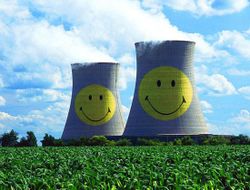Difference between revisions of "Nuclear power"
(Stub) |
(desc) |
||
| (5 intermediate revisions by the same user not shown) | |||
| Line 1: | Line 1: | ||
{{concept | {{concept | ||
| − | | | + | |wikipedia=https://en.wikipedia.org/wiki/Nuclear_power |
| + | |image=Nuclear power.jpg | ||
| + | |constitutes=Energy source | ||
| + | |description=Developed after [[World War 2]] as a source of radionuclides to use to create [[nuclear weapons]] | ||
}} | }} | ||
==Official narrative== | ==Official narrative== | ||
| Line 6: | Line 9: | ||
==Problems== | ==Problems== | ||
| − | The nuclear power industry has never been separate from the production of [[nuclear weapons]]. | + | ''[[The Guardian]]'' reported in 2017 that {{SMWQ |
| + | |format=inline | ||
| + | |date=21 Dec 2017 | ||
| + | |source_name=The Guardian | ||
| + | |source_URL=https://www.theguardian.com/news/2017/dec/21/hinkley-point-c-dreadful-deal-behind-worlds-most-expensive-power-plant | ||
| + | |text=Nuclear power is facing existential problems around the world, as the cost of renewable energies fall and their popularity grows. “The maths doesn’t work,” says Tom Burke, former environmental policy adviser to BP and visiting professor at both Imperial and University Colleges. “Nuclear simply doesn’t make sense any more.” | ||
| + | |authors=Holly Watt | ||
| + | |subjects=Nuclear power, renewable energy | ||
| + | }} | ||
| + | |||
| + | ===Risks=== | ||
| + | The nuclear power industry has never been separate from the production of [[nuclear weapons]], for which reason governments have tended not to perform serious accounting of the potentially disastrous ecological risks. | ||
| + | |||
| + | ====Whistleblower==== | ||
| + | [[Richard Levernier]] had 23 years of experience in nuclear safety. When he pointed out a major gap in nuclear power safety planning, his security clearance was withdrawn and he was assigned to clerical duties. After some years, he won a legal battle against theis retaliation, which was declared illegal, but his security clearance was not reinstated. | ||
| + | ===Waste=== | ||
It has never found a satisfactory long term storage solution for nuclear waste. As of 2015, only one country, [[Finland]], has seriously addressed the problem of permanent storage.<ref>http://www.unwelcomeguests.net/558</ref> | It has never found a satisfactory long term storage solution for nuclear waste. As of 2015, only one country, [[Finland]], has seriously addressed the problem of permanent storage.<ref>http://www.unwelcomeguests.net/558</ref> | ||
| + | |||
| + | ==See Also== | ||
| + | * http://www.unwelcomeguests.net/Category:Nuclear_Power | ||
{{SMWDocs}} | {{SMWDocs}} | ||
| − | {{ | + | ==References== |
| + | {{Reflist}} | ||
Latest revision as of 12:09, 26 May 2019
(Energy source) | |
|---|---|
 | |
| Interest of | • Crispin Aubrey • Chris Busby • Ian Butterfield • Lawrence Hafstad • Hilda Murrell • Nuclear Regulatory Commission • UK/Atomic Energy Authority |
| Developed after World War 2 as a source of radionuclides to use to create nuclear weapons | |
Contents
Official narrative
"Too cheap to meter", anyone? That was quite a while ago.
Problems
The Guardian reported in 2017 that “Nuclear power is facing existential problems around the world, as the cost of renewable energies fall and their popularity grows. “The maths doesn’t work,” says Tom Burke, former environmental policy adviser to BP and visiting professor at both Imperial and University Colleges. “Nuclear simply doesn’t make sense any more.”” [1]
Risks
The nuclear power industry has never been separate from the production of nuclear weapons, for which reason governments have tended not to perform serious accounting of the potentially disastrous ecological risks.
Whistleblower
Richard Levernier had 23 years of experience in nuclear safety. When he pointed out a major gap in nuclear power safety planning, his security clearance was withdrawn and he was assigned to clerical duties. After some years, he won a legal battle against theis retaliation, which was declared illegal, but his security clearance was not reinstated.
Waste
It has never found a satisfactory long term storage solution for nuclear waste. As of 2015, only one country, Finland, has seriously addressed the problem of permanent storage.[2]
See Also
Related Documents
| Title | Type | Publication date | Author(s) | Description |
|---|---|---|---|---|
| Document:Chris Busby Wiki Introduction | profile | 1 February 2013 | Chris Busby | This is Busby's own introduction to a comprehensive resume of his life and career to date. It clearly outlines the corrupt nature of the modern scientific research and peer review in areas of science that affect powerful government, military and industrial interests. |
| Document:Dishonesty and the Science-Policy Interface | presentation | 1 November 2011 | Chris Busby | A hard-hitting indictment of Western Scientific Establishments in glossing over the issue of nuclear safety, and attacking those, such as Busby, who are independently researching the effects of ionising radiation on human health. Powerful interests clearly feel threatened by Dr Busby's work and are seeking to suborn the scientific process to their own ends whatever the catastrophic effects on human health of disasters such as Fukushima. |
| Document:Suppression of dissent in science | paper | 1999 | Brian Martin |